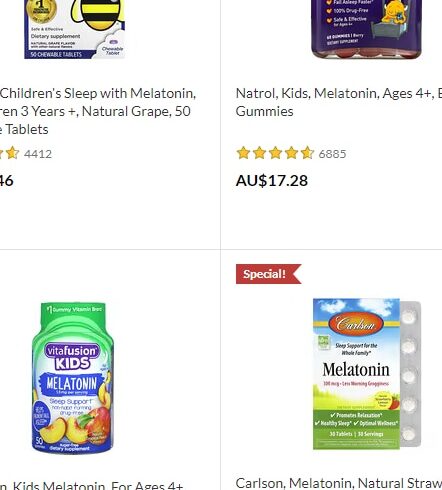
Many Australian families use melatonin supplements to help their children get a good night’s sleep, while others believe it supports their own wellbeing.
These supplements can be easily bought online, including in fruit-flavoured gummy formulations.
But popular US-based online health retailer iHerb has suspended sales to Australia after rising concerns over a spike in overdoses among children.
Here’s why doctors are urging people to be cautious about using overseas shopping websites as a go-to for medicines.
What is melatonin?
Melatonin is a hormone the body produces naturally, which helps regulate the sleep-wake cycle.
Here’s some more information from Health Direct:
Melatonin levels are higher at night and are lower in bright daylight.
Your body naturally increases melatonin levels about 2 hours before going to sleep, to get you ready for sleep.
Some people take melatonin supplements to help with sleep problems, including insomnia and for jet lag.
And while a prescription is required in most cases, melatonin gummies could be easily bought and imported from the popular US online retailer iHerb.
These gummies, which look like lollies, have become increasingly popular with parents trying to give their children a good night’s sleep, says Tim Jones, chair of child and young person’s health at the Royal Australian College of General Practitioners (RACGP).
“It’s been a massive trend over the last five years and we’re really seeing more melatonin being used as the first step,” Dr Jones told ABC AM.
Why did iHerb suspend the sale of melatonin in Australia?
Data from WA’s Poisons Information Centre revealed there had been a spike in melatonin overdoses, mostly in children who had taken too many gummies.
The data found calls to the poisons hotline about melatonin overdoses jumped from 175 in 2018 to 322 as of August this year.
This statement appears on iHerb’s website when you search for melatonin supplements. (Supplied)
In a statement, iHerb said it would suspend all melatonin sales to Australian customers while reviewing its order protocols.
“The health and well-being of our customers always comes first,” a spokesperson said.
“Our goal is to support wellness responsibly and to give our customers confidence that they can shop with safety and trust.”
If your child takes too much melatonin, side effects could include:
Prolonged drowsinessDaytime sleepinessHeadachesNauseaIrritabilityNightmaresHospitalisation (rare cases)
Dr Jones welcomed the suspension.
“This is a good step in taking melatonin back to where it needs to be considered as a medication and not viewed as just a supplement you can order online.”
Australian Medical Association (AMA) president Danielle McMullen also says it’s “encouraging to see iHerb taking a responsible approach” while regulatory issues are examined.
The company has not said how long the suspension will last.
Experts say symptoms of a melatonin overdose in children can include drowsiness and nightmares. (Adobe Stock)
A study from the US also found calls for paediatric melatonin ingestions to US Poison Control Centers increased 530 per cent from 2012 to 2021.
What are the concerns around buying supplements online?
Supplements that are imported, which are not listed or registered in the Australian Register of Therapeutic Goods (ARTG), cannot be guaranteed as safe, efficacious or of high quality, a TGA spokesperson said.
This could include melatonin products that are imported from overseas.
“It’s important that consumers understand that medicines available on the internet may not meet the strict safety standards imposed by the TGA,” Dr McMullen said.
A TGA spokesperson said melatonin was available as a pharmacist-only medicine in Australia for the treatment of short-term insomnia for over-55s, or jet lag in adults.
Dr Jones says formulations of online melatonin supplements can be unreliable. (Supplied)
Its use is approved for children as a prescription medicine in “limited circumstances”.
This includes for the treatment of insomnia in children and adolescents (2–18 years) with Autism Spectrum Disorder (ASD) and/or Smith–Magenis syndrome.
“Melatonin (gummies or otherwise) are not approved for use in Australia for children for any other use, noting the TGA has not evaluated the safety or efficacy for broader use in this age group,” they said.
The TGA also cautioned Australians from buying medicines online as they may contain undisclosed harmful ingredients or may be fake.
Dr Jones agrees, saying that the formulations can be unreliable: you can’t be confident how much melatonin is in the tablet or gummy and sometimes it might not be present at all.
“There was a large review of the quality of online ordered melatonin products in the US earlier this year and what it found was that melatonin products can contain anywhere from 1 per cent to 1,000 per cent of the dose that they indicate on the bottle.
“These are very unregulated online products and their safety is not guaranteed.”
These melatonin gummies for kids are advertised on iHerb. (Supplied)
Dr Jones says there is evidence to support the use of supplements for children with autism and ADHD, although parents should still consult their doctor.
“There’s a lot more study in those groups of kids about how to use melatonin well and safely, because sleep cycle issues are much more common,” he says.
Lolly-like supplements ‘a real worry’
The fact that some medications, including melatonin, taste sweet like candy is another concern for doctors.
“Because the gummy and liquid form of melatonin tastes really good, kids don’t see these as medicines,” Dr Jones said.
“They see them [gummies] as lollies, and that’s a real worry.”
For parents that have a jar of gummies in the cupboard at home, Dr Jones’s advice is to go and chat to your trusted health professional.
“If you’re treating your child with melatonin, we really want to know all the other steps you’re taking to support your child’s sleep.
“GP’s have excellent training and behavioural strategies to support a child’s sleep.”





